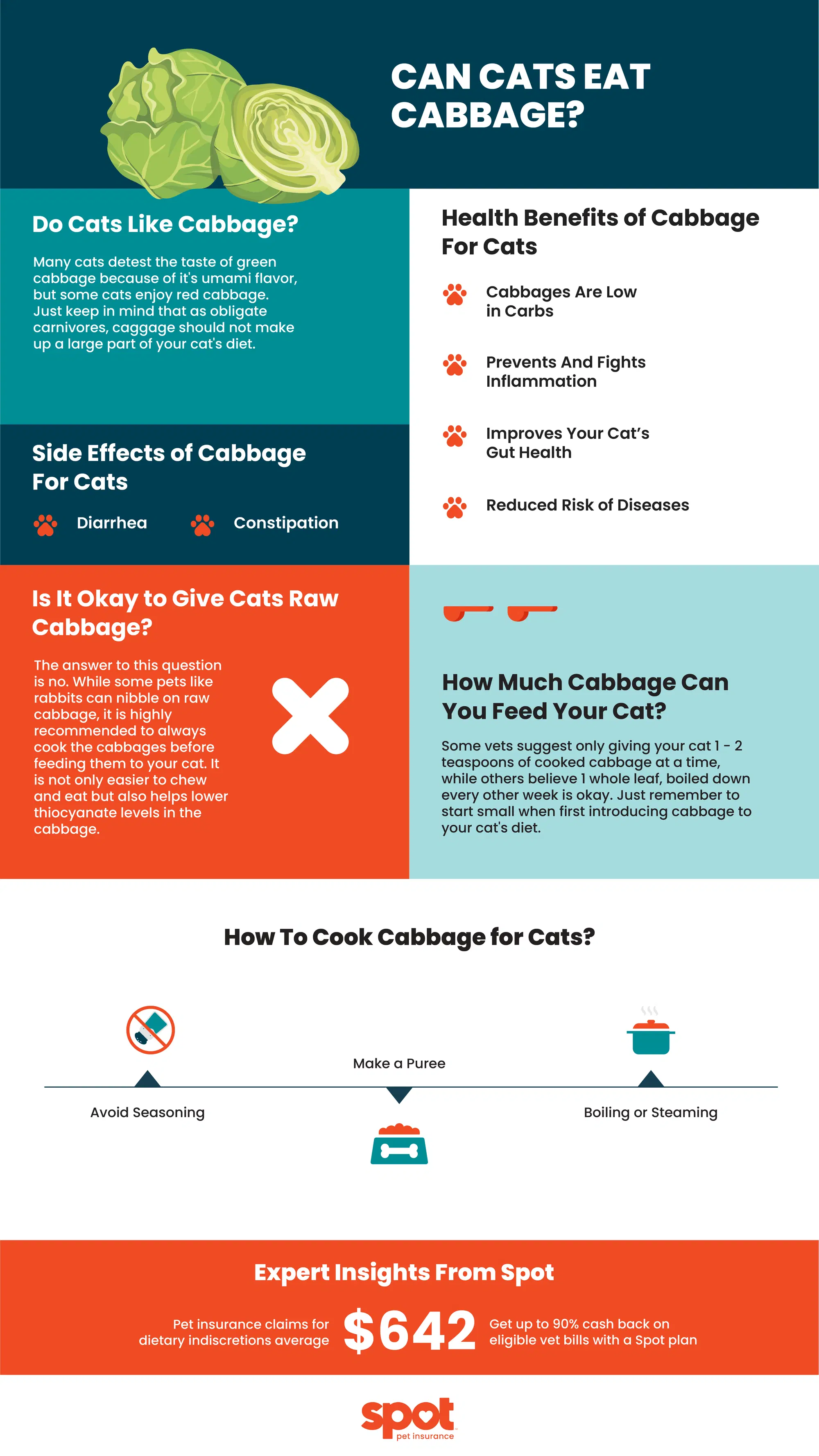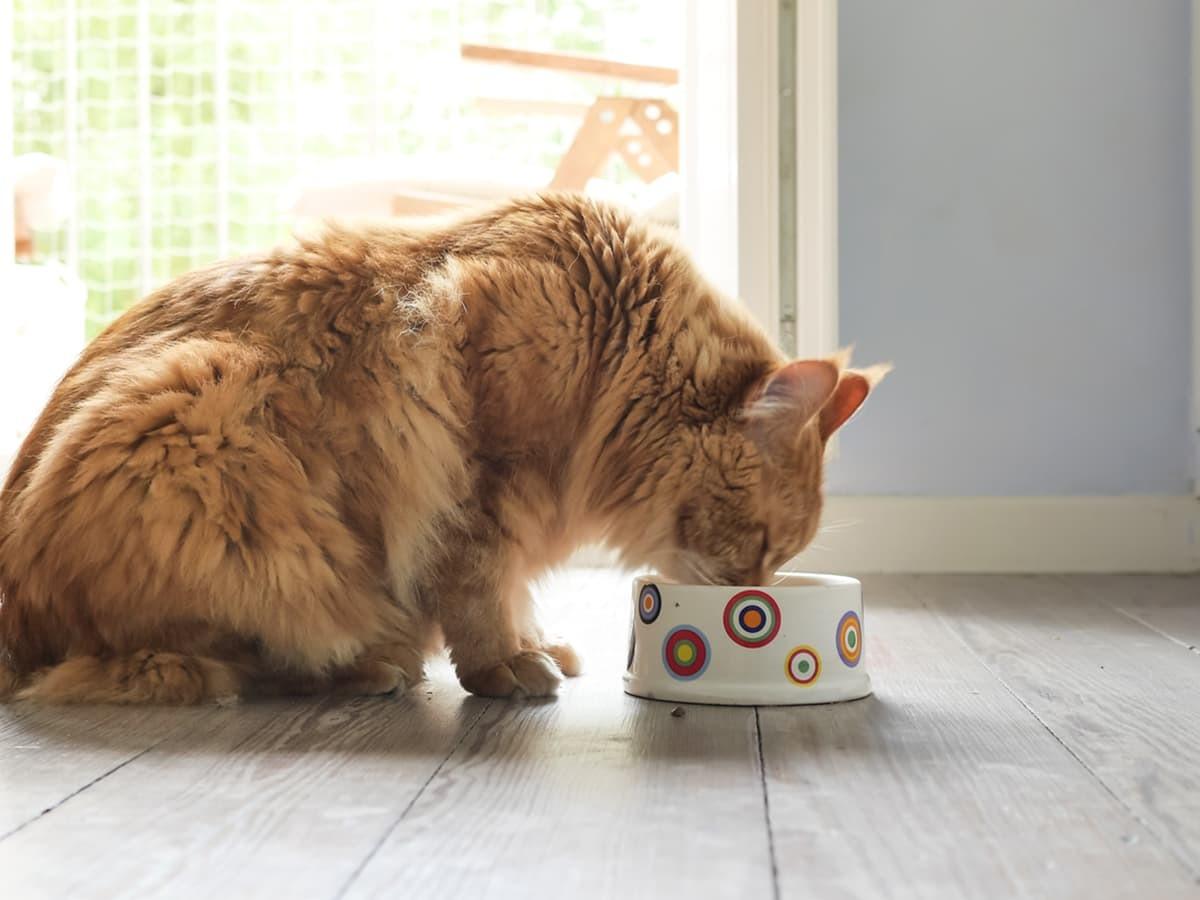From sandwiches to salads, if there is one veggie we humans don’t mind munching on, it's cabbage. Cabbage is loaded with nutrients and is great for your health too. If you're a cat parent, you may be tempted to feed your cat a few cabbage leaves. But can cats eat cabbage? The answer is yes!1

Do Cats Like Cabbage?
There are hundreds of varieties of cabbage grown throughout the world with green cabbage being the most common type. Others that you may also find are red and purple cabbage.
Many cats may detest the taste of green cabbage because of its umami flavor. Some may prefer munching on red cabbage instead. Both red and purple cabbage are nutritious and sweeter tasting. However, this may not make any difference to your cat's preference as they generally lack the receptor for sweet flavors.
Health Benefits of Cabbage For Cats
If you are someone who always purchases cabbage at the store, it might be exciting to learn that cabbages are not just great for your health but for your cats too. Below are some potential health benefits of cabbage for cats that you should definitely know about.1
Cabbages Are Low in Carbs
Cats are one of the animal kinds that do not need carbohydrates in their diet. In such cases, cabbages turn out to be a healthy-snacking option. Especially if your cat needs to shed some kilos off their weight. Read this article for more tips on how to help your pet stay at a healthy weight.
Prevents And Fights Inflammation:
Cabbages are loaded with antioxidants like sulforaphane that can help curb the inflammation in your cat's gut. Fun fact: A single cabbage leaf used as compresses can reduce pain in cats suffering from mastitis. Just apply the leaf on the affected gland and leave it for a few hours.
Improves Your Cat’s Gut Health:
Cabbage has both insoluble and soluble fiber, which can improve digestion and provides good bacteria for your cat’s gut. This is why it can be a good idea to treat your cat with occasional servings of cabbage for their good gut health.
Reduced Risk of Diseases:
Cabbages contain a flavonoid called anthocyanin which help reduce the risk of heart-related diseases. The antioxidants also attack the free radicals in the body which can lower the risk of cancerous cysts.
Rich in Vitamins and Minerals
Filled with the goodness of vitamin K: Important to help prevent blood clots.
Potassium: Strengthens your cell movements.
Vitamin B6 & Folate: Strengthens the nervous system.
Vitamin C: Healthy natural immune system.
How Much Cabbage Can You Feed Your Cat?
Cats can eat cabbage, but it always comes down to how much of any food is good for your cat. Your vet may suggest sticking to 1 or 2 teaspoons of cooked cabbage while some experts may suggest one whole boiled leaf every other week. While both can be considered the correct method of serving cabbage to cats, it's usually best to follow a routine.
How To Cook Cabbage for Cats?
The best way to serve cabbage to cats is by thoroughly boiling or steaming it. If your cats enjoy purees, you can always grind some leaves up and make a yummy puree out of it. However, always remember to avoid seasoning the cabbage, since adding spices, salt, garlic, onion, etc. can have adverse effects on your cat’s health.
Side Effects of Cabbage For Cats
With so many nutritious values to its name, you obviously want your cat to enjoy some cabbage. However, it's also important to jot down some negative effects of feeding your cat some cabbages.2
When served in large amounts, cabbages can suppress the thyroid glands of cats because cabbages have thiocyanate compounds in them. It's always a good idea to start with fewer servings and gradually introduce it to your cat’s meals to help avoid an upset stomach.
Cats are carnivores who find it difficult to digest vegetables well. If you serve cabbage regularly to your cat, they may suffer from constipation and diarrhea.
If your cat has eaten a little too much cabbage it may also cause bloating which can be extremely discomforting to your cats.
Is It Okay to Give Cats Raw Cabbage?
The answer to this question is no. While some pets like rabbits can nibble on raw cabbage, it is highly recommended to always cook the cabbages before feeding them to your cat. It is not only easier to chew and eat but also helps lower their thiocyanate levels.2
Expert Insights From Spot
While sharing our favorite foods with our pets can be tempting, it's important to remember that not all human foods are safe for our feline friends. Spot's internal data shows that pet insurance claims for dietary indiscretions average $642*, highlighting the importance of caution and research before sharing snacks with your pet.
Conclusion:
Although cats can eat cabbage, they shouldn’t be dependent on it for their nutrients. Yes, they can help give your cats the nutrition they need but they aren’t as beneficial to cats as they are to humans. If you are introducing cabbage into your cat’s diet, always consult your trusted vet first.
If your cat does gobble up extra bits of cabbage, do not panic. Cabbages are considered safe and beneficial for your cat’s health. You can feed your cats cabbage as long as it is in moderation. Because cats are carnivores in nature, they need animal-based protein to thrive, which vegetables cannot substitute for. So always be mindful of not going overboard and always sticking to moderation when it comes to feeding your cats some cabbage.

I've had the privilege of immersing myself in the realm of pet safety. As the owner of an energetic mini golden doodle, I know just how stressful being a pet owner can be. I am dedicated to ensuring our beloved pets enjoy a life brimming with good health.
*Jan 2019 to Aug 2024 Spot Pet Insurance Services, LLC claims data.
Sy, Aurus. "Can Cats Eat Cabbage?" Wag, Jan. 10, 2023, https://wagwalking.com/wellness/can-cats-eat-cabbage.
"Can Cats Have Cabbage?" PetsCare, n.d., https://www.petscare.com/news/post/can-cats-have-cabbage.
The information presented in this article is for educational and informational purposes only and does not constitute or substitute for the advice of your veterinarian.












